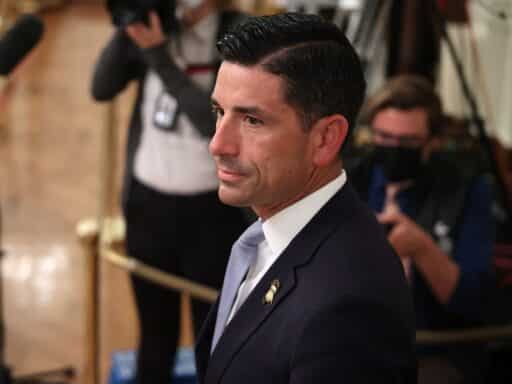The judge said Chad Wolf’s unlawful appointment to his position invalidated his immigration policy.
A federal judge ruled on Saturday that the acting secretary of the Department of Homeland Security, Chad Wolf, did not have the authority to halt new applications to the Obama-era Deferred Action for Childhood Arrivals (DACA) program in July.
That judge, Nicholas Garaufis of the US District Court of the Eastern District of New York, found that Wolf’s memo suspending new applicants to the immigrant program was invalid because he was not lawfully appointed to his position, in a decision that reflects the limitations of President Donald Trump’s pattern of relying heavily on appointed acting officials unconfirmed by the Senate to enact policy.
It also raises questions about whether he’ll be able to put in place enduring policies through current or new acting personnel in the final months of his presidency before President-elect Joe Biden takes over in January.
Garaufis said on Saturday that Trump did not place Wolf — who has been serving as acting secretary since November 2019, and has not been confirmed by the Senate — at the helm of his federal agency in accordance with the law.
“DHS [the Department of Homeland Security] failed to follow the order of succession as it was lawfully designated,” wrote Garaufis, an appointee of President Bill Clinton. “Therefore, the actions taken by purported Acting Secretaries, who were not properly in their roles according to the lawful order of succession, were taken without legal authority.”
The finding aligned with the Government Accountability Office’s claim in August that Wolf and another DHS official were not legitimate officials because they were installed by another official who himself was not appropriately appointed to his position due to a paperwork error.
The ruling means that Wolf’s July 28 memo effectively suspending new applications to the DACA program — which 640,000 immigrants known as “dreamers,” who were brought to the US illegally as children, rely on to live and work in the US — has been deemed invalid. Wolf’s memo had shortened the renewal period for protections under the program from two years to one year.
Politico’s Josh Gerstein has explained who is likely to benefit the most from Garaufis’s decision:
The most immediate beneficiaries of the court ruling are likely to be immigrants who are eligible for DACA but did not apply before the Trump administration cut off applications in September 2017. The decision could also lead DHS to restore a DACA benefit the administration largely halted at the same time: the ability for Dreamers to leave the country and return, without losing their quasi-legal status and work permits.
However, as the Washington Post notes, the ruling did not immediately eliminate the Trump administration’s changes to the DACA program — instead, the government and the groups that brought the case, which includes the National Immigration Law Center, must now meet to discuss the steps to come. And there are other, related, cases pending that could distort this most recent ruling.
The grounds upon which the memo was found to be invalid highlights the short-sightedness of Trump’s style of using temporary appointments to conduct government business, something he said he prefers to do because of the speed and flexibility it offers.
Trump’s reliance on acting officials is a break from the past
According to the Brookings Institution, Trump has opted to appoint acting officials across the government “at a pace that far exceeds his predecessors.”
Advocates for balanced government have criticized Trump’s use of temporary appointments to circumvent Senate confirmation as an abuse of executive power, and a way to appoint ideologically extreme or loyal officials without input from the legislative branch.
For example, Trump appointed Anthony Tata to a senior civilian position at the Pentagon through a temporary role after his nomination for a Senate-confirmed position fell through. Tata withdrew from the Senate confirmation process after it was discovered that he had a history of bigoted remarks, such as calling former president Barack Obama a “terrorist leader.”
But beyond placing those unable to pass Senate scrutiny in key positions, Trump has used acting positions to circumvent laws and norms on appointing officials at departments. According to an analysis by Just Security in September, there are at least 15 other officials in 12 executive branch departments — other than Wolf — who don’t lawfully hold their positions. One reason for this is the Trump administration has persistently disregarded the time limitations on temporary appointments requiring Senate confirmation under the Federal Vacancies Reform Act.
As the end of Trump’s term in office approaches, there are signs that he could use the appointment of more temporary officials as a way to sow discord, slow the transition, or attempt to make a final policy splash before Biden’s term begins.
For example, Trump recently appointed three new top senior officials at the Pentagon last week — most notably, replacing Defense Secretary Mark Esper, whom he fired by tweet on Monday, with acting Defense Secretary Christopher Miller.
Experts told Vox’s Alex Ward that they suspect that “Trump finally had an opening to clean house at the Pentagon with the election now over, and that he’s putting in people more amenable to his wishes in order to finally accomplish some of the policies the Esper-led Pentagon had pushed back on — such as withdrawing all remaining US troops from Afghanistan before Christmas.”
Removals have happened at other federal departments as well: “Top officials at the agencies overseeing the safety of US nuclear infrastructure, the Justice Department’s election fraud branch, US foreign aid and a key climate change report have all also been removed over the past week,” according to CNN.
In some of these cases, new officials may be able to pursue lasting policies that shape the final chapter of Trump’s presidency. But in other cases, their abilities may be limited by legal questions over their authority, as was the case with Wolf and his attempts to modify the DACA program.
Author: Zeeshan Aleem
Read More



